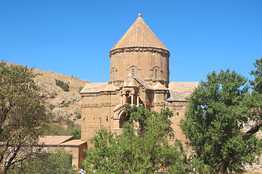By JOE PARKINSON
AKDAMAR ISLAND, Turkey—Turkey allowed Armenians to worship at a symbolic but politically sensitive church here for the first time since the collapse of the Ottoman Empire on Sunday, in a service hailed by Turkish officials as a sign of growing tolerance for religious minorities, but which underscored the lingering distrust between Ankara and Yerevan.
The emotional two-hour mass at the Church of the Holy Cross—an iconic landmark on Akdamar island in the turquoise waters of Lake Van in Turkey’s poverty-stricken southeast region—was attended by about 1,000 people. But that was a fraction of the 5,000 visitors expected, as a partial Armenian boycott saw thousands cancel their trips after Turkish authorities refused to display a 200-kilogram (440-pound) cross on the church’s roof, claiming it was too heavy and could damage the structure. The five-meter-tall (16.5-foot-tall) cross instead was set next to the belltower of the church.
Armenians Pray at Akdamar
Joe Parkinson/The Wall Street JournalThe 10th century Church of the Holy Cross on Akmadar Island is one of the finest remaining examples of medieval Armenian architecture. It currently functions as a museum, after renovation by the Turkish government was completed in 2007 at a cost of $1.5 million.
Worshippers, the vast majority from the Armenian diaspora community, packed into the small red-stone church or watched Orthodox priests deliver the first liturgy there in almost 100 years on big-screen televisions specially erected for the event. Some pilgrims, overcome with emotion, held wooden crosses aloft as they prayed. Others exchanged stories about the ancient Armenian civilization that once existed in Turkey, but was almost erased in 1915 in what many regard as genocide. Turkey strongly denies that a genocide took place, describing the killings as the tragic result of a civil war in which all sides suffered.
Eighty year-old Lebanese Armenian Victoria Tutunjian, whose parents fled to Beirut to escape those killings, said she “always hoped but never imagined” she could come to pray here. “I’m so happy this ceremony is taking place and I will come here every year until the day I die. But Turks are still my enemy, and coming here and walking on this soil is my revenge,” she said, clutching a small Armenian flag.
 Other Turks and armenians here were more positive about the service’s significance. “This is a great day for all Armenians, I’m confident things will start to change now,” said Tigran Abrahamian, a 45-year old industrial engineer from Istanbul, who is married to a Turk and brought his family to the service. An estimated 170,000 Armenians live in Turkey, according to Turkish authorities, who say more than half aren’t legal residents.
Other Turks and armenians here were more positive about the service’s significance. “This is a great day for all Armenians, I’m confident things will start to change now,” said Tigran Abrahamian, a 45-year old industrial engineer from Istanbul, who is married to a Turk and brought his family to the service. An estimated 170,000 Armenians live in Turkey, according to Turkish authorities, who say more than half aren’t legal residents.
Still, Muslim Turkey and Christian Armenia remain bitterly divided over their troubled history. The border between them remains closed despite U.S.-brokered peace accords signed last year.
For Armenians across the world, the Church of the Holy Cross, abandoned in 1915 and reopened in 2007 as a museum after a $1.5 million restoration, has become symbolic of the deportation and killings at the hands of Ottoman forces. The controversy over the church’s cross underlines the mistrust between the neighbors. In Yerevan on Sunday, 1,500 people attended an alternative religious service at a genocide memorial that denounced the Akdamar service as a publicity stunt.
“Our mission for today was to show that the Turkish government should not use our heritage as a propaganda tool to pretend that they are tolerant,” said Hayk Demoyan, director of Yerevan’s Genocide Museum, in a telephone interview after he addressed the crowds.
Turkish Culture and Tourism Minister Ertugrul Gunay said that the government had agreed to the Armenian religious service in good faith and that nationalists on both sides were exploiting the event for political purposes.
Sunday’s service was the second of two special church openings recently permitted by the Turkish government. Ankara in August allowed Christians to pray at a Greek Orthodox monastery in Sumela, in the Black Sea region, for the first time since the country’s creation.
Often criticized for its treatment of Christian minorities, Ankara has promoted the services as proof of its growing commitment to religious tolerance. Critics say the tightly controlled services are a carefully choreographed public-relations campaign designed to boost Turkey’s prospects of joining the European Union, for which it is a candidate.
“Yes, this is a PR stunt by the Turkish government to show it is being respectful to its minorities… but, frankly, if it means that Turkey and Armenia can move closer towards resolving their differences, then who cares,” said Ara Sarafian, director of the Gomidas Institute, a London-based research organization.
Local businesses in the region are Van are supportive of improved relations, hoping religious tourists would help the region profit. Gaye Akay, a hotelier born in Van but based in Ankara, is planning to open the region’s first five-star hotel next year. “We think this is the beginning of something really special,” she said. “More Armenians and international tourists will start coming here and spending their dollars.
Negotiations to open the border between Turkey and Armenia went into deep freeze, as neither side ratified a deal outlined last year and both sides accused the other of setting additional conditions.
Write to Joe Parkinson at [email protected]



Leave a Reply